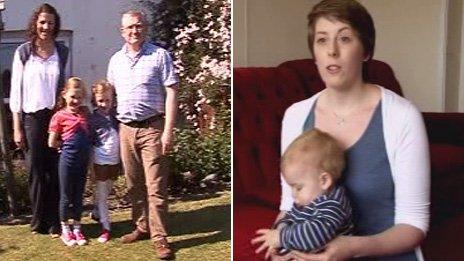Carwyn Jones says "enough is enough"
- Published
- comments
What Carwyn Jones had to say on the shape of the Welsh economy in his regular briefing to the media this week was overshadowed by another matter he wanted to get off the First Ministerial chest.
But the warning he sounded, and tone he struck, shouldn't be lost along the way.
In two weeks time George Osborne will deliver his Spending Review and Mr Jones clearly expects substantial cuts to the money his government has to spend as a result of it. Any cuts to departmental spend in areas like health and education, remember, will be reflected in turn in the money that comes to Wales, though where ministers choose to bring down the axe will be up to them. That, as they say, is devolution.
Budget lines are already being scrutinised in forensic detail, line by line, according to the First Minister. It'll be necessary to make in-year cuts, ones he'd clearly hoped to avoid. Will he cut universal benefits? No, he won't. Definitely not between now and the next election? Definitely not but there will be cuts in other areas and ministers will have to adopt "a different approach" to mitigate their effects.
And then came what he called "a clear message" to the Chancellor: that the cuts coming from Westminster are putting "an unacceptable burden" on the Welsh economy and that "enough is enough".
In London Eds Miliband and Balls are out and about seeking to reassure voters that Labour would adopt "iron discipline" in public spending. They've made clear that the coalition's current spending plans would be a Labour government's starting point.
In Cardiff, Carwyn Jones' message of 'no more' seems at the very least to be adopting rather a different tone.
We'll know no more now until 26 June - but to keep us going, we asked a willing colleague to delve deep into the Office for National Statistics website and take a look back at the Welsh economy over the last few years. We'll drip feed you much of his work over the next weeks and months but given BBC Wales' is looking at 'What Wales is worth' this week, let me share just a little of what he came up with.
Salaries first. The figures showing the annual average of weekly earnings in Wales, external tell us the average pay-packet in 2006 was £419. By last year it was down to £380. The figures appear to hold their own against inflation until 2009/2010, then fall. You can delve into what the TUC made of the figures here.
Here's another measure: how much money we have left in out pockets after tax. These figures, external suggest that it's the people of South West Wales who have least left, while those who live in Powys come out on top.
I'll sum up much of the response from Powys as - really?

Steve Mason and his wife Elin (left) and Ceri Maskell
Take Steve Mason and his wife Elin, teachers who live in Builth Wells with their twin daughters, Cadi and Mali who are seven today - penblwydd hapus! Both Steve and Elin are still in jobs and accept there are many others who've faced far more uncertainty than they have. But the hard winter cost them dearly in fuel and things don't feel all that good around them, they say. Their explanation for the statistics? That everything tends to be later getting to mid Wales - good times and bad. 'It already feels tough and uncertain to me but that doesn't mean there isn't worse to come' is Steve's view.
In Rosebush near Maenclochog in Pembrokeshire Ceri Maskell has no trouble at all in accepting that the South West is at the bottom of this particular pile of statistics. Her husband works in Withybush hospital in Haverfordwest, while she's at home looking after their son Isaac, who'll be a year old in a few week's time - in fact on the very day the Chancellor delivers his Spending Review. Isaac will be in Folly Farm while George Osborne takes to the dispatch box.
Ceri left university last year and is happy to stay at home for now but the family is finding it tough to cover the bills. Food and fuel bills are growing, wages are not and job opportunities locally are limited, says Ceri.
The rent must be found and buying a house is out of their reach. Other than child benefit, the family gets nothing and doesn't expect anything. "I'm nervous" says Ceri. "I don't think things feel as though they're getting better here at all."
What about another set of statistics, particularly apt ones on the day the latest unemployment figures are published. Unemployment levels in Wales has stayed the same, the claimant count is down and the number of people employed is up. Put all of that in the pot and accept that governing parties will say times remain challenging, but that things are moving in the right direction. Those not in power will say too little is moving.
So take a look at these figures, showing the under-employment rate, external. The percentage of people in Wales who are in work of some kind, but could, would and want to work more hours has risen from 6.5% before the recession hit, to 10.3% afterwards.
All of which may not bother Mali, Cadi or Isaac at this point but for their parents, and many others, spell out that these are still pretty tough times.